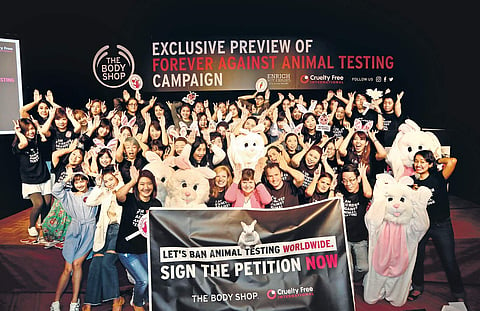

It was a moment Anita Roddick would have been proud of. The late British entrepreneur, who started the world’s first ethically-driven consumer company in 1976, that introduced community trade in 1987 and campaigned against animal testing in 1989 (a full European ban was achieved in 2013), would have been delighted that her cosmetics giant, The Body Shop, along with campaign partner Cruelty Free International, just launched its most ambitious campaign ever—Forever Against Animal Testing—that calls for a global ban on animal testing in cosmetic products and ingredients. The signature campaign is on its way to garner eight million signs needed to take the resolution to the United Nations.
The campaign kickstarted with celebrations that saw giant costumed bunnies dancing wi th abandon at a special press meet this summer in Tokyo, in the presence of international heads of the company. Michelle Thew, head of Cruelty Free International, a global organisation concerned with social justice and animal protection issues, says that they’ve been pushing to end animal testing for 30 years. “When we first started campaigning in the 1980s, everyone was aware of animal testing, but we need to make them aware that it’s not over, that this is not done,” she says. Despite the European Union and countries such as India, Taiwan, and New Zealand, among others, that have banned animal testing, it remains a problem. Around 80 per cent of countries still have no law against testing in cosmetics, and an estimated five lakh animals are used worldwide in such testings each year. “We want to change people’s mind-set, companies’ practice of using animals to test products,” she says. The alternatives are clear: patch testing on humans, using lab-produced skin, and computer-based analysis.
There will be three stages to the campaign, says Michelle. “We need to get the UN to listen and put it on their agenda. That is what the signatures are all about. Then we need to get the General Assembly of the UN to agree to a resolution, where every country in the world has a vote, so we need that to pass. We would need every country to then adopt the UN resolution into their own legislation.”
She believes the global approach is the right one. “There will be countries that don’t ban and we don’t want animal testing to just move around the globe.”
What distinguishes a non-testing company from a testing one is the Leaping Bunny certification from Cruelty Free International, that is the gold standard of compassion for animals. “The difference between European companies committed to the Bunny and those that haven’t is that the Bunny companies will not test for any market in the world,” says Michelle. But you can still test if you are a European company selling to a country like China, where animal protection laws are not in place yet. “What we want is an international ban on testing, so that all companies can make the same commitment for every market in the world,” says Michelle. Power to the bunny.
Sign the petition: thebodyshop.com/ban-animal-testing